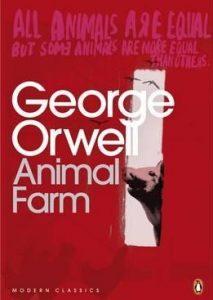“Mr. Jones, of the Manor Farm, had locked the hen-houses for the night, but was too drunk to remember to shut the popholes.”
And so began one of the greatest political satire novels of all time!
Animal Farm was George Orwell’s second last novel. He finished the book at the end of World War Two while working as a literary editor. Many believed that it would soon threaten Britain’s precarious alliance with Russia. As a result, numerous publishers rejected it between April 1944 and August 1945.
As a reflection on the deterioration of the Soviet Union after the rise of Stalinism, this novel subtly challenges totalitarianism throughout. So-called ‘innocent’ farm animals are at the centre of this tale and aptly portray a dictatorship society. As a result, it’s one of the 20th century’s greatest novels.
Summary
It follows a group of farm animals who decide to rebel against the farmer who forces them to obey him. Therefore, mistreated and overworked, they plan an equal society, one where every animal is treated the same. The pigs take control of the rebellion, teaching others how to work for themselves. It all quickly spirals out of control, however, as leaders emerge, propaganda spreads, and suspicion and doubt appear at every corner. After all, “all animals are equal, but some animals are more equal than others.”
Commentary
By far Orwell’s greatest work, it’s a simple story that reveals the darker side of something far more important.
Praise
- The novel is best known for its masterful allegories: stories which contain hidden meanings. Animal Farm takes the incredibly complicated state of Russia during the Bolshevik Revolution and simplifies it. The dictatorship state is broken down into a fairytale.
- It exposes how totalitarianism governments work. The animals are promised things will get better but then slowly descend into autocracy. It shows how something so tyrannical can creep upon society, as well as the dramatic fallout.
- The characters are realistic and represent known figures. The old boar that inspires revolution: Karl Marx. The fierce quiet boar who follows through: Joseph Stalin. The rival pig who starts leading but changes course: Leon Trotsky. The other animals believe the propaganda spread by their leaders. Eventually, none of them remember a time where they were allowed to think for themselves.
Critique
- Unfortunately, allegories are two-fold. Some people prefer not to read into things and take a book at face value. If you do this with Animal Farm, it becomes a nonsensical story about talking animals and pigs who write. The symbolism is hard to understand, especially for younger readers.
- There is debate about the validity of this book. Orwell himself was British and very close-minded. He used the word ‘communist’ for everything he didn’t agree with, including people who were black, Jewish, or gay. As a result, this degrading, comical and even extravagant tale isn’t factual.
- The metaphors can be too obvious. The leader is Napolean, the Old Major represents Lenin, and even Snowball is a childish reference to ‘White Russian’ Trotsky. The references can be sickening at times as Orwell didn’t even try to blend symbols with the rest of the message.
Recommendations
Overall, I’d give George Orwell’s Animal Farm a three out of five. A political satire, nearly everyone who reads it enjoys the story.
I’d recommend it for any political fans, as well as those who love classics or realistic fiction. It’s definitely not a story for children, but anyone aged thirteen or above will very likely enjoy it.

Want to read it for yourself?
Prefer to listen instead?
